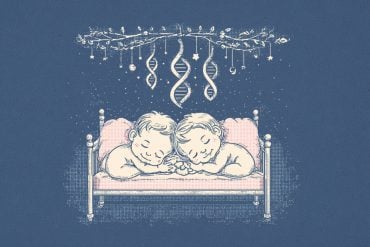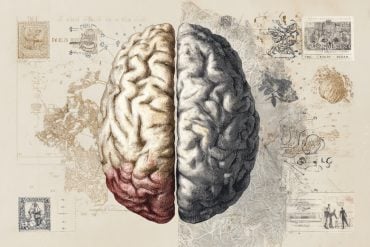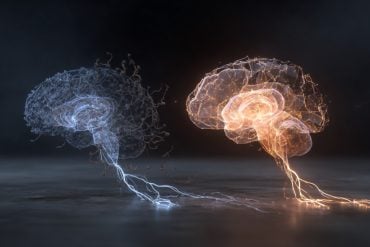Summary: Researchers say decisions which recruit intuition, or gut feelings, are seen as a reflection of the true self.
Source: American Psychological Association.
Why do some people trust their gut instincts over logic? It could be that they see those snap decisions as a more accurate reflection of their true selves and therefore are more likely to hold them with conviction, according to research published by the American Psychological Association.
“We offer what we believe to be a novel and unique approach to the question of why people come to hold certain attitudes,” said lead researcher Sam Maglio, PhD, an associate professor of marketing at the University of Toronto Scarborough. “Focusing on feelings as opposed to logic in the decision-making process led participants to hold more certain attitudes toward and advocate more strongly for their choices.”
The research was published in the journal Emotion.
Maglio and co-author Taly Reich, PhD, an assistant professor of marketing at Yale University, conducted a series of four experiments involving a total of more than 450 participants, including local residents, undergraduate students and online survey takers. In each experiment, participants had to choose from a selection of similar items, such as different DVD players, mugs, apartments or restaurants. In each case, participants were asked to make their decision either in a deliberative, logical manner or in an intuitive, gut-based one. They were then asked a series of questions about the choice.
Participants who were instructed to make an intuitive, gut-based decision were more likely to report that that decision reflected their true selves. The researchers also found that participants who made intuitive, gut-based decisions were more certain of their decisions and more likely to advocate for them.
In one experiment, participants were asked to choose between two different restaurants, again based either on intuition or deliberation, and were then instructed to publicize their choice by emailing their decision to their friends. The people who picked a restaurant intuitively shared their choice with more people.
“This suggests that focusing on feelings doesn’t just change attitudes — it can change behavior, too,” said Maglio.
One thing that was surprising, according to Maglio, was how willing people were to make an intuitive, gut-based decision when instructed. “So much folk wisdom says that we should eschew intuition because careful deliberation is thought to be the surest path to good choices, but we can’t escape our gut feelings,” he said.

“In making decisions, people must decide not only what to choose, but how to choose it,” said Maglio. “Our research suggests that individuals focusing on their feelings in decision-making do indeed come to see their chosen options as more consistent with what is essential, true and unwavering about themselves.”
But the surety that comes with making a gut-based instead of logical choice can be a double-edged sword, said Maglio. For instance, if someone chooses an exercise program (e.g., cycling) based on feelings, he or she may be more likely to stick to it. On the other hand, gut-based decisions made in today’s polarized political climate may not be conducive to a functioning democracy.
“When digging our heels in is a good thing, like making sure we hop on the bike every day, there’s little downside and a lot of benefit. But dug-in heels give way to stubbornness and isolationism in the blink of an eye,” said Maglio. “When our political attitudes are made intuitively and make us certain that we’re right, we shut ourselves off from the possibility that we might be even a little bit wrong. For this reason, perhaps a bit of the openness facilitated by deliberation isn’t a bad thing after all.”
Source: Jim Sliwa – American Psychological Association
Publisher: Organized by NeuroscienceNews.com.
Image Source: NeuroscienceNews.com image is in the public domain.
Original Research: Open access research for “Feeling Certain: Gut Choice, the True Self, and Attitude Certainty” by Sam Maglio, PhD, and Taly Reich, PhD in Emotion. Published September 10 2018.
doi:10.1037/emo0000490
[cbtabs][cbtab title=”MLA”]American Psychological Association”In Gut We Trust When It Comes to Choices.” NeuroscienceNews. NeuroscienceNews, 10 September 2018.
<https://neurosciencenews.com/gut-choices-9832/>.[/cbtab][cbtab title=”APA”]American Psychological Association(2018, September 10). In Gut We Trust When It Comes to Choices. NeuroscienceNews. Retrieved September 10, 2018 from https://neurosciencenews.com/gut-choices-9832/[/cbtab][cbtab title=”Chicago”]American Psychological Association”In Gut We Trust When It Comes to Choices.” https://neurosciencenews.com/gut-choices-9832/ (accessed September 10, 2018).[/cbtab][/cbtabs]
Abstract
Feeling Certain: Gut Choice, the True Self, and Attitude Certainty
Decisions need not always be deliberative. Instead, people confronting choices can recruit their gut feelings, processing information about choice options in accordance with how they feel about options rather than what they think about them. Reliance on feelings can change what people choose, but might this decision strategy also impact how people evaluate their chosen options? The present investigation tackles this question by integrating insights from the separate literatures on the true self and attitude certainty. Four studies support a process model by which focusing on feelings (vs. deliberation) in choice causes people to see their true selves reflected in those choices (Studies 1 and 2), leading to enhanced attitude certainty (Study 3) and advocacy on behalf of that attitude (Study 4) while offering robustness checks and accounting for alternative explanations throughout. Discussion of these findings highlights the opportunity for new insights at the intersection of feeling-focused decision making, attitudes, and the true self.







